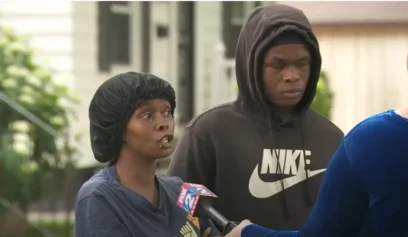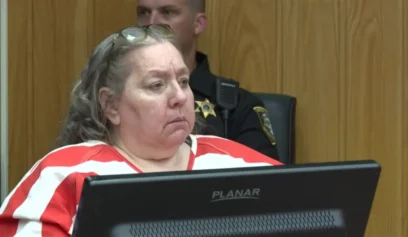A California man faces life in prison after a jury found him guilty in the brutal slaying of his Black girlfriend, whose dismembered body was found last summer inside a trash bag near the shores of San Francisco Bay.
Joseph Roberts, 43, was convicted of second-degree murder in the July 2023 death of 27-year-old Rachel Elizabeth Imani Buckner after an Alameda County jury deliberated less than a full day.
The murder of the beautiful young mother and law student shocked the Bay Area community 10 months ago.

Buckner’s head, hands, and feet had been cut off with power tools, leading Alameda Police Chief Nishant Joshi to note grimly, “In my 25 years as a police officer, I have never seen anything as disturbing as this.”
Despite the barbaric nature of his crime, Roberts is eligible for parole, with a sentence of 15 years to life expected when the judge sends him away on June 14, according to Alameda County District Attorney Pamela Price, the first Black woman to serve as the county’s top prosecutor.
“Today’s verdict brings justice not only to Rachel Elizabeth Imani Buckner but also to her daughter, her immediate and extended family, and our community,” Price said in a statement. “What happened to Rachel Elizabeth Imani Buckner is unimaginable. The condition of her body when it was found shocks our humanity. This tragedy will leave her family and our community forever traumatized whenever her murder is mentioned.”
For now, Roberts remains locked up in the Santa Rita Jail in Dublin, California.
Previously Buckner’s mother, S. Jamila Buckner, started a GoFundMe that raised $101,680, which paid for funeral expenses and to help raise the woman’s orphaned daughter.
“To anyone that got to know and be around Imani, she was a beautiful and radiant light,” S. Jamila Buckner wrote last year as the family sought aid for a proper memorial. “She had an infectious spirit that you could not help but smile when around and gravitate towards.”
Investigators with the Alameda Police Department found Buckner’s remains on July 20, 2023, after someone called police to report a large black garbage bag that was discarded on a nature trail near the Harbor Bay Club on Bay Farm Island.
Inside the sack, police were stunned to find the hacked-up body of a young woman.
Despite the killer’s efforts to conceal Buckner’s identity, the remains were successfully traced, and Roberts became the primary suspect after police had been called to the couples’ apartment numerous times over four years due to episodes of domestic violence.
After the cold-blooded killing, investigators learned that Roberts and Buckner became romantically involved in 2019 after Buckner graduated from Howard University and enrolled at Golden Gate University Law School, where she met Roberts.
Soon, the couple moved in together at the apartment in Pleasanton, where the relationship turned sour almost immediately, prosecutors said.
Roberts was still living with Buckner when she went missing a year ago, however, he never reported her missing, and a full two months would pass before her remains were ultimately found.
During the trial, prosecutors presented evidence showing Roberts’ DNA had been collected from duct tape that was used to bundle the garbage bag containing Buckner’s body.
Following Roberts’ conviction in the René C. Davidson Courthouse, family members said they were still devastated over the excruciating details of Buckner’s death, saying her vicious slaying had “left a void that is indescribable in her community and village.”
Second-degree murder is generally defined as a deliberate killing that is not premeditated or planned in advance, often referred to as a “crime of passion.”
It can also occur when a person acts with extreme disregard for human life but without the specific intent to kill.
Third-degree murder, on the other hand, typically involves a killing that involves premeditation or malice aforethought required for first- or second-degree murder.
While a sentence of 15 years to life means that Joseph Roberts will be eligible for parole after serving at least 15 years, it does not guarantee his release.
Typically, a parole board will consider various factors, including the nature of the crime, Roberts’ behavior in prison, and the impact on the victim’s family, before deciding whether to grant parole.
Roberts could potentially walk free again one day, but the final decision on this rests with the parole board.


